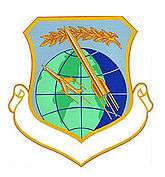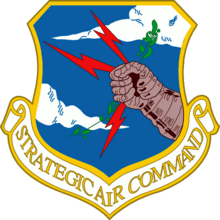13th Strategic Missile Division
| 13th Strategic Missile Division | |
|---|---|
|
564th Strategic Missile Squadron Convair SM-65D Atlas[1] | |
| Active | 1940–1966 |
| Country |
|
| Branch |
|
| Role | Strategic Missile Command and Control |
| Engagements |
|
| Insignia | |
| 13th Strategic Missile Division emblem (approved 4 January 1961)[2] |
 |
The 13th Strategic Missile Division is an inactive United States Air Force unit. Its last assignment was with Fifteenth Air Force, based at Francis E. Warren Air Force Base, Wyoming. It was inactivated on 2 July 1966.
Initially formed as an air defense organization in the Caribbean, the unit later commanded Boeing B-17 Flying Fortress groups of Eighth Air Force in England. Its units carried out strategic bombardment missions over Occupied Europe and Nazi Germany during World War II. During the Cold War, the unit was a command and control organization of Strategic Air Command, controlling early ICBM wings in the Midwest.
History
The unit was initially organized at Langley Field, Virginia, as the 13th Composite Wing in October 1940.[3] It was assigned to the new Caribbean Air Force as a command organization for units in the Caribbean.[4]
Assigned to Borinquen Field, Puerto Rico, its mission was to provide an air strike force for the defense of Puerto Rico and the U.S. Virgin Islands. During the period 1940 to 1942, the wing controlled 21 Douglas B-18 Bolo medium bombers and 92 assorted fighters in about a dozen groups and squadrons. On 17 April 1942, the wing was inactivated in an organizational change. Its mission was taken over by the VI Interceptor Command, Antilles Air Task Force.[4]
The organization was reactivated as the 13th Bombardment Wing in October 1942 at MacDill Field, Florida under Third Air Force. It was one of three bombardment wings (12th, 13th, 14th) which were formed at MacDill for deployment to Eighth Air Force in England as command organizations.[3] The 13th deployed in June 1943. There, it controlled the 95th, 100th and 390th Bombardment Groups under the 3d Bombardment Division, flying Boeing B-17 Flying Fortresses.[3] Controlling the combat operations of the groups, it carried out strategic bombing of enemy aircraft, petroleum, and ball bearing industries as well as German airfields. Later, organizational units took part in the famous raid against the ball bearing industry at Schweinfurt in October 1943 and followed with missions against shipyards and shipbuilding installations at Wilhelmshaven and Bremen.[3][5] With the end of the war in Europe, it returned to the United States and was inactivated on 17 October 1945.[3]
The 13th was again activated as the 13th Air Division under Strategic Air Command (SAC) in July 1959. The 13th was one of SAC's first strategic missile command organizations, initially being assigned two Strategic Missile Wings (703d, 706th) at Lowry AFB, Colorado with the new SM-68 Titan I ICBM.[6] However, these wings never became operational,[7] and the 13th became an SM-65 Atlas organization, controlling the 389th and 451st Strategic Missile Wings.[8] In 1963, it assumed command of the 90th Strategic Missile Wing with the new LGM-30A Minuteman I.[3]
In 1965, the first-generation Atlas intercontinental ballistic missile was taken off alert and its subordinate wings were inactivated.[8] It was briefly assigned some KC-135A Tankers and EC-135 electronic intelligence aircraft after the 98th Bombardment Wing was inactivated at Lincoln Air Force Base, Nebraska afterwards, however the 13th Strategic Missile Division was itself inactivated in July 1966, its mission being taken over by the 821st Strategic Aerospace Division in a SAC reorganization.[2][9]
Lineage
- Established as the 13th Composite Wing on 2 October 1940
- Activated on 10 October 1940
- Inactivated on 17 April 1942
- Redesignated: 13th Bombardment Wing on 23 August 1942
- Activated on 1 October 1942
- Redesignated 13th Bombardment Wing (Heavy) on 1 February 1943
- Redesignated 13th Combat Bombardment Wing (Heavy) on 30 August 1943
- Redesignated 13th Combat Bombardment Wing, Heavy on 24 August 1944
- Redesignated 13th Bombardment Wing, Heavy on 18 June 1945
- Redesignated 13th Bombardment Wing, Very Heavy on 17 August 1945
- Inactivated on 17 October 1945
- Redesignated 13th Air Division on 20 May 1959
- Activated on 1 July 1959
- Redesignated 13th Strategic Missile Division on 1 January 1963
- Discontinued and inactivated, on 2 July 1966[2]
Assignments
|
|
Components
|
Wings
Squadron
|
Groups
|
Stations
|
|
Aircraft and missiles
|
|
Heraldry
Light blue, issuant from base a sphere light green with land areas vert, grid lined azure, the sinister quarter of the last with grid lines of the field, above the sphere in chief an olive branch arched fesswise or, overall an aircraft and a missile bendwise each trailing speedlines of the like and all within a diminished border of the last.[2]
See also
References
Notes
- ↑ Serial 58-220, on pad 564-A2, Warren I site, F. E. Warren AFB, Wyoming, 1959
- 1 2 3 4 5 6 7 8 9 10 "Factsheet 13 Strategic Missile Division". Air Force Historical Research Agency. 4 October 2007. Archived from the original on 30 October 2012. Retrieved 6 April 2014.
- 1 2 3 4 5 6 Maurer, Combat Units, pp. 382-383
- 1 2 Hagedorn,
- ↑ Freeman,
- ↑ SAC.com 703d Missile Wing
- ↑ Ravenstein,
- 1 2 Walker & Powell,
- ↑ "Factsheet 821 Strategic Aerospace Division". Air Force Historical Research Agency. 11 October 2007. Archived from the original on 30 October 2012. Retrieved 20 March 2014.
Bibliography
![]() This article incorporates public domain material from the Air Force Historical Research Agency website http://www.afhra.af.mil/.
This article incorporates public domain material from the Air Force Historical Research Agency website http://www.afhra.af.mil/.
- Freeman, Roger A. (1970). The Mighty Eighth: Units, Men and Machines (A History of the US 8th Army Air Force). London, England, UK: Macdonald and Company. ISBN 978-0-87938-638-2.
- Hagedorn, Dan (1995). Alae Supra Canalem: Wings Over the Canal. New York, NY: Turner Publishing Co. ISBN 978-1563111532.
- Maurer, Maurer, ed. (1983) [1961]. Air Force Combat Units of World War II (PDF) (reprint ed.). Washington, DC: Office of Air Force History. ISBN 0-912799-02-1. LCCN 61060979.
- Ravenstein, Charles A. (1984). Air Force Combat Wings, Lineage & Honors Histories 1947-1977 (PDF). Washington, DC: Office of Air Force History. ISBN 0-912799-12-9.
- Walker, Chuck & Powell, Joel (2005). Atlas The Ultimate Weapon. Burlington, Ontario, Canada: Apogee Books. ISBN 1-894959-18-3.


.jpg)